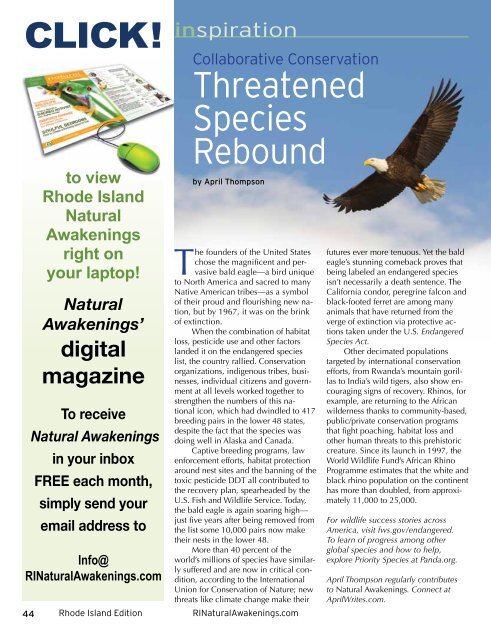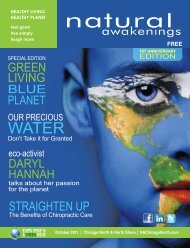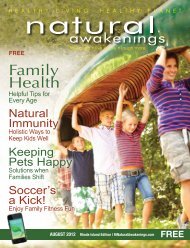Providence, RI - Natural Awakenings
Providence, RI - Natural Awakenings
Providence, RI - Natural Awakenings
You also want an ePaper? Increase the reach of your titles
YUMPU automatically turns print PDFs into web optimized ePapers that Google loves.
CLICK!<br />
to view<br />
Rhode Island<br />
<strong>Natural</strong><br />
<strong>Awakenings</strong><br />
right on<br />
your laptop!<br />
<strong>Natural</strong><br />
<strong>Awakenings</strong>’<br />
digital<br />
magazine<br />
To receive<br />
<strong>Natural</strong> <strong>Awakenings</strong><br />
in your inbox<br />
FREE each month,<br />
simply send your<br />
email address to<br />
Info@<br />
<strong>RI</strong><strong>Natural</strong><strong>Awakenings</strong>.com<br />
inspiration<br />
Collaborative Conservation<br />
Threatened<br />
Species<br />
Rebound<br />
by April Thompson<br />
The founders of the United States<br />
chose the magnificent and pervasive<br />
bald eagle—a bird unique<br />
to North America and sacred to many<br />
Native American tribes—as a symbol<br />
of their proud and flourishing new nation,<br />
but by 1967, it was on the brink<br />
of extinction.<br />
When the combination of habitat<br />
loss, pesticide use and other factors<br />
landed it on the endangered species<br />
list, the country rallied. Conservation<br />
organizations, indigenous tribes, businesses,<br />
individual citizens and government<br />
at all levels worked together to<br />
strengthen the numbers of this national<br />
icon, which had dwindled to 417<br />
breeding pairs in the lower 48 states,<br />
despite the fact that the species was<br />
doing well in Alaska and Canada.<br />
Captive breeding programs, law<br />
enforcement efforts, habitat protection<br />
around nest sites and the banning of the<br />
toxic pesticide DDT all contributed to<br />
the recovery plan, spearheaded by the<br />
U.S. Fish and Wildlife Service. Today,<br />
the bald eagle is again soaring high—<br />
just five years after being removed from<br />
the list some 10,000 pairs now make<br />
their nests in the lower 48.<br />
More than 40 percent of the<br />
world’s millions of species have similarly<br />
suffered and are now in critical condition,<br />
according to the International<br />
Union for Conservation of Nature; new<br />
threats like climate change make their<br />
44 Rhode Island Edition <strong>RI</strong><strong>Natural</strong><strong>Awakenings</strong>.com<br />
futures ever more tenuous. Yet the bald<br />
eagle’s stunning comeback proves that<br />
being labeled an endangered species<br />
isn’t necessarily a death sentence. The<br />
California condor, peregrine falcon and<br />
black-footed ferret are among many<br />
animals that have returned from the<br />
verge of extinction via protective actions<br />
taken under the U.S. Endangered<br />
Species Act.<br />
Other decimated populations<br />
targeted by international conservation<br />
efforts, from Rwanda’s mountain gorillas<br />
to India’s wild tigers, also show encouraging<br />
signs of recovery. Rhinos, for<br />
example, are returning to the African<br />
wilderness thanks to community-based,<br />
public/private conservation programs<br />
that fight poaching, habitat loss and<br />
other human threats to this prehistoric<br />
creature. Since its launch in 1997, the<br />
World Wildlife Fund’s African Rhino<br />
Programme estimates that the white and<br />
black rhino population on the continent<br />
has more than doubled, from approximately<br />
11,000 to 25,000.<br />
For wildlife success stories across<br />
America, visit fws.gov/endangered.<br />
To learn of progress among other<br />
global species and how to help,<br />
explore Priority Species at Panda.org.<br />
April Thompson regularly contributes<br />
to <strong>Natural</strong> <strong>Awakenings</strong>. Connect at<br />
AprilWrites.com.





